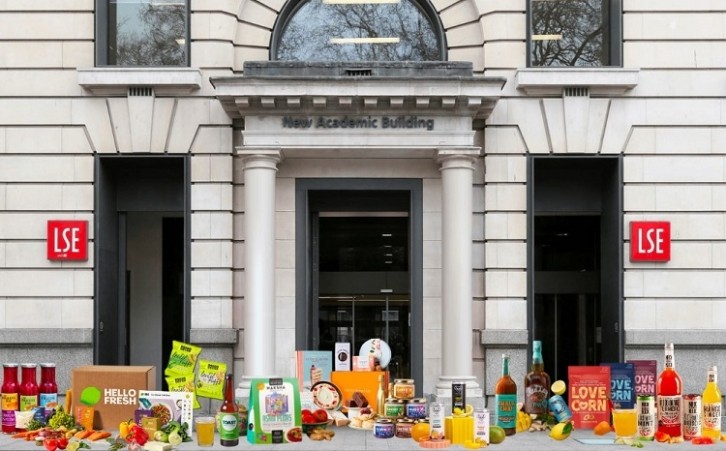‘Like speed-dating for entrepreneurs’: New food & drink incubator opens in London

LSE’s entrepreneur hub, LSE Generate, is preparing to launch its pilot programme for food and beverage go-getters. Coined the Food & Beverage Deepdive Programme, the initiative will run year-round with the aim of helping entrepreneurs validate, build and scale their businesses.
In bringing academia and the UK food and drink scene ‘closer together’, LSE Generate hopes to offer an alternative career to students historically more likely to follow careers in banking, management consultancy, or policymaking roles.
“In an age where escalating costs and stifling student debt means that more families than ever are having weigh up the pros and cons of embarking on a university education, here’s a respected seat of learning that’s prepared not simply to immerse itself within one of the UK’s most vibrant and successful sectors, but reaching out to its far-reaching network of high-flying alumni to foster the next generation of budding entrepreneurs,” Nisha Ramisetty, advisor for special programmes at at LSE Generate, told FoodNavigator.
The programme: from networking to buyer matchmaking
LSE Generate is describing the initiative as offering a ‘deep dive in the nitty gritty world of entrepreneurship’. Specifically, this means offering the opportunity to create industry connections, gain expert insights and mentorship.
LSE is building an alumni base of food and drink entrepreneurs, with ex-students responsible for setting up companies such as Hello Fresh, Nix & Kix and Dalston’s Soda.
“This inclusive course offers so many possibilities since it will be open to anyone in the wider London F&B fraternity who has the appetite to build a F&B brand whilst learning from those who have travelled similar paths in the past,” said Ramisetty.
The programme, launching 23 November, is founded of three pillars: ‘Natter’ includes networking gathers, co-working space access and panels; ‘Nourish’ is a development programme designed to upskill F&B entrepreneurs; and ‘Nurture’ is focused on supporting business development, including via investor and buyer matchmaking opportunities.
“It’s a fact that over 200 food & drink businesses have been set up by LSE alumni over the last decade (and that’s the ones we currently know about), contesting every imaginable aisle from sustainable beers and healthier living snacking, to avant-garde soft drinks, best-in-class recipe kits and indulgent fast food,” said Ramisetty, citing food and drink companies such as Five Guys, Toast Ale and Love Corn.
“We will also be working tirelessly to unearth other amazing brands with strong LSE ties who would also be willing to give back to the next generation of food & drink disruptors.”
Spotlight on upskilling opportunities
According to the LSE Generate advisor for special programmes, the biggest obstacle to start-up success is not funding as some may expect, but inexperience. The Food & Beverage Deepdive Programme has been designed to fill potential skill gaps, collaboratively.
“An incubator programme is like speed-dating for entrepreneurs: a safe, supportive environment where all manner of ‘nagging thoughts’ can be easily posed, debated and resolved whilst best practice wisdom and cost-saving hacks can be shared.”
As to what specific skills the entrepreneurs should expect to learn, Ramisetty stressed the course is ‘adaptable’ in order to keep pace with the ‘fluid’ food and beverage marketplace.
It may be that future founders are seeking out ways to build brand awareness without breaking the bank, she told this publication. Or else they’re looking to establish partnership with support agencies, ranging from PR to packaging and social media.
“Perhaps the primary focus is learning how best to stay afloat within inflexible payment terms and manufacturing MOQ [minimum order quantity] culture which leans too heavily in favour of those buyers with large war chests and lists clous versus their bootstrapped start-up peers.
“Maybe the immediate priority is simply about establishing a strong rapport with those retailers and wholesalers that might best appreciate your range; managing their short to medium-term expectations whilst avoiding the ignominy of being ghosted or delisted further down the line.
“Of course, no two SMEs will ever experience the same growing pains and setbacks.”
Consumers want new food and drink products, but aren’t getting them
The programme launch comes at a volatile time in the new product development sphere.
According to market research firm Mintel, more than a third of UK, Italian and Spanish shoppers look out for NPD – whether in the form of new foods or flavours – all or most of the time. But new research suggests share of brand-new food and drink products launching in-store has taken a sharp dive.
In the UK specifically, the share of new retail food and drink launches (brand-new, as opposed to new flavours or new packaging) is down 16% this year until September 2023, and down 33% since 2014.
Across Europe, share of brand-new food and drink products hitting shelves is down almost 50% in the past decade. In both the UK and Europe, launches of products with new packaging designs is on the up.
Mintel director of food and drink Alex Beckett puts this down to sector struggles associated with food inflation costs. “Faced with soaring energy and ingredient costs, and labour shortages, manufacturers have had no choice but to focus on the bottom line and, to some extent, this has come at the cost of R&D and maintaining a busy innovation pipeline.”
Signs that food inflation costs will ease over the coming months are starting to show, FoodNavigator understands.















